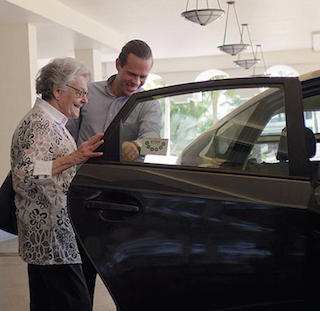
A new partnership between ride-hailing service Uber and healthcare transportation platform Circulation will test a nonemergency medical transportation service at a Program of All-inclusive Care for the Elderly as well as acute-care and children’s hospitals, the entities announced Tuesday.
John Brownstein, Ph.D., cofounder of Circulation, told McKnight’s Senior Living that the service could expand to settings such as independent living, assisted living and skilled nursing in the future.
The initial pilot programs will be conducted at Boston Children’s Hospital, Mercy Health System’s three acute-care hospitals and PACE in Southeast Pennsylvania, and Nemours Children’s Health System in Wilmington, DE, to determine whether the service meets the goals of reducing healthcare costs and eliminating barriers that prevent people from getting to and from medical appointments.
Mercy Health System still is deciding which PACE will participate. “We are still finishing the evaluation within our PACE programs and will have an announcement to our eligible subscribers as soon as a final determination has been made,” Gary D. Zimmer, M.D., senior vice president and CEO of the Clinically Integrated Network at Mercy Health System, told McKnight’s Senior Living.
The service is expected to roll out across six additional states later this year.
Uber and Lyft recently announced transportation programs for residents of senior living communities, even if the residents don’t own smartphones. The new pilot differs from those programs, however, in that Circulation’s portal, which the company said is compliant with the Health Insurance Portability and Accountability Act, integrates with existing healthcare information systems and Uber in an effort to provide individuals, caregivers and hospital staff a seamless overall experience. Information about a patient’s health, insurance, ride eligibility and special travel considerations (such as the need for a wheelchair) are automatically populated from a health system’s records into the Circulation system.
In the pilot, PACE and hospital transportation coordinators will be able to schedule and manage on-demand rides; update patient information files with transportation scheduling information; ensure that physicians, nurses and other caregivers are notified when patients arrive for appointments; and receive alerts on Circulation’s centralized multi-patient dashboard, all in real time.
Rides will be initiated by care and service providers much as they arrange for taxi vouchers. Medicaid, health insurers and, sometimes, even hospitals, will pay for the rides. All billing and payment reconciliation with Uber and healthcare organizations will be handled on the back end of Circulation’s system.
“We are confident that Circulation will help us improve access and patient-centered care to acute-care and elderly patients across Southeastern Pennsylvania who need help getting to their medical appointments,” Zimmer said. “Unlike other new offerings that are stand-alone systems to dispatch on-demand vehicles, Circulation’s platform integrates with our internal systems as well as with ride providers like Uber. It’s much more efficient for our transportation coordinators and allows us to seamlessly orchestrate the ride into the overall patient experience.”



